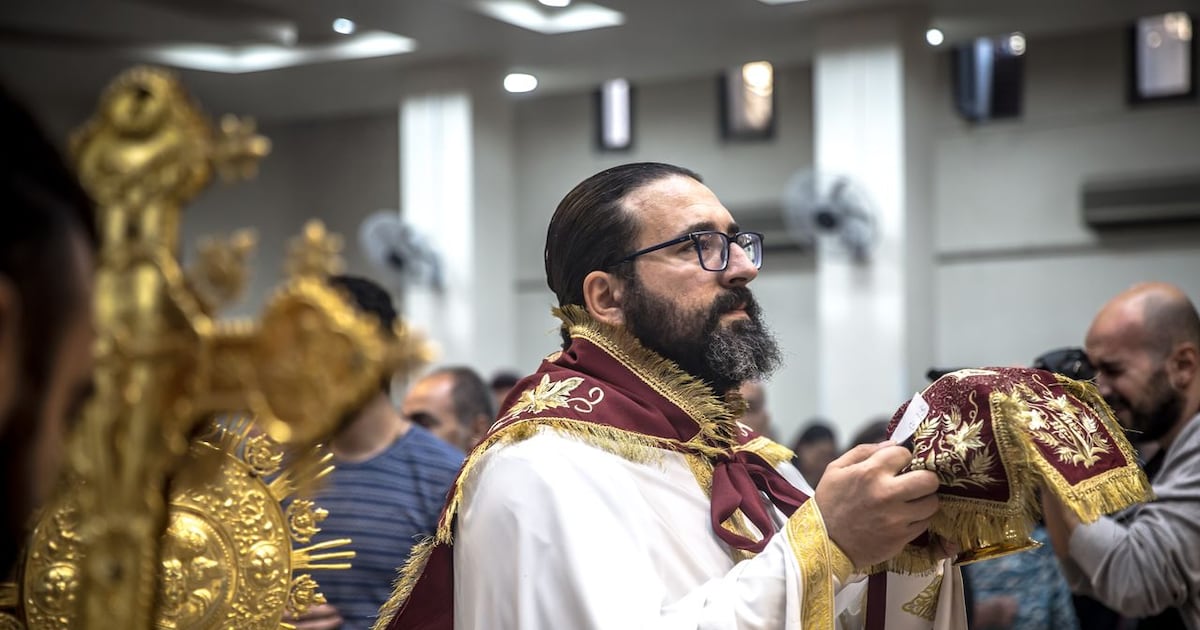World
Syrian Christians Face Uncertainty One Year After Regime Change

A year after the fall of Bashar al-Assad’s regime, Syrian Christians are grappling with fear and uncertainty. On a recent Sunday, the Mar Elias Church in Damascus, previously targeted by a suicide bombing, hosted hundreds for the Divine Liturgy despite lingering anxiety. The church’s main section is currently undergoing renovations following the attack on June 22, 2023, which resulted in the deaths of at least 22 people, according to church officials, although other reports indicate the toll may be as high as 25.
The group Saraya Ansar al-Sunna claimed responsibility for the attack, framing it as a response to perceived provocations in the area. Meanwhile, the Syrian government linked the bombing to the Islamic State, which did not take responsibility for the incident.
Samir Mansour, a 62-year-old parishioner whose son was injured in the bombing, expressed his deep concerns about the safety of Christians in Syria. “I think all the Christians, maybe they will die,” he stated, highlighting a widespread sentiment among the community. Many Christians are contemplating emigration, seeking visas to escape the escalating violence.
In December 2023, Ahmed al-Sharaa assumed the presidency after a coalition of rebels, led by the Islamist militant group Hayat Tahrir al-Sham, seized power. Al-Assad’s regime had long positioned itself as a protector of religious minorities, even as it was responsible for the majority of civilian casualties during the prolonged conflict. Pre-2011, Christians comprised approximately 10 percent of Syria’s population of 22 million, but significant emigration has reduced this figure drastically.
The European Union condemned the church attack, stating, “Violence against Christians is an attack against all Syrians.” The EU emphasized the need for intensified efforts to combat terrorism and to ensure the security of all citizens, regardless of their ethnic or religious background.
Despite initial fears regarding religious freedoms under the new government, many Christians report that daily life has remained relatively unchanged. For instance, alcohol continues to be readily available in predominantly Christian neighborhoods such as Bab Touma. Nevertheless, incidents of sectarian violence have increased, particularly targeting Alawites in coastal regions and in the Druze city of Sweida. This has raised alarms about the government’s ability to maintain control over its allied forces and the overall stability of the newly established regime.
Syria’s foreign ministry described the Mar Elias bombing as a desperate attempt to undermine national coexistence. President al-Sharaa pledged to capture those responsible for the attack, asserting that the government is committed to restoring order despite the challenges ahead.
Following the Mar Elias incident, the church community rallied in Damascus, demanding the withdrawal of foreign fighters who had supported the rebel coalition. Fr. Youhanna Shahade, the church’s priest, emphasized the need to honor those lost in the attack, referring to them as “martyrs.” He highlighted the church’s role in providing support to approximately 5,000 families through medical care, education, and other assistance. As demand for help grows, he noted that many community members are struggling to meet their basic needs.
The United Nations reported that in 2023, around 90 percent of Syrians live below the poverty line, affecting all communities. Many Christians, who faced severe oppression under the previous regime, now find themselves navigating a precarious economic landscape with job losses following the regime change.
Despite the challenges, Fr. Shahade remains committed to his role. The church, which conducted a baptism ceremony for 22 children in memory of the lives lost during the bombing, illustrates the resilience of the community. They have taken measures to bolster security, appointing young men to monitor the premises, albeit unarmed. When asked about future attacks, he simply stated, “We will pray.”
While President al-Sharaa acknowledged the legacy of conflict and sectarian divides in Syria, he assured that the rule of law would be upheld and that all citizens have the right to live peacefully in the country. However, many community members, including Fr. Shahade, express concern over the lack of clear communication from the new government. “It’s so foggy, everything is new,” he reflected, voicing uncertainty about what lies ahead for Christians in Syria.
As the community continues to navigate this transitional period, the fear of further violence looms large, leaving many Christians uncertain about their future in a country still grappling with the effects of years of conflict.
-

 Top Stories3 months ago
Top Stories3 months agoTributes Surge for 9-Year-Old Leon Briody After Cancer Battle
-

 Entertainment4 months ago
Entertainment4 months agoAimee Osbourne Joins Family for Emotional Tribute to Ozzy
-

 Politics4 months ago
Politics4 months agoDanny Healy-Rae Considers Complaint After Altercation with Garda
-

 Top Stories4 months ago
Top Stories4 months agoIreland Enjoys Summer Heat as Hurricane Erin Approaches Atlantic
-

 World5 months ago
World5 months agoHawaii Commemorates 80 Years Since Hiroshima Bombing with Ceremony
-

 Top Stories3 months ago
Top Stories3 months agoNewcastle West Woman Patricia Foley Found Safe After Urgent Search
-

 Top Stories5 months ago
Top Stories5 months agoFianna Fáil TDs Urgently Consider Maire Geoghegan-Quinn for Presidency
-

 World5 months ago
World5 months agoCouple Convicted of Murdering Two-Year-Old Grandson in Wales
-

 World5 months ago
World5 months agoGaza Aid Distribution Tragedy: 20 Killed Amid Ongoing Violence
-

 World5 months ago
World5 months agoAristocrat Constance Marten and Partner Convicted of Infant Murder
-

 Top Stories4 months ago
Top Stories4 months agoClimbing Errigal: A Must-Do Summer Adventure in Donegal
-

 Top Stories4 months ago
Top Stories4 months agoHike Donegal’s Errigal Mountain NOW for Unforgettable Summer Views









